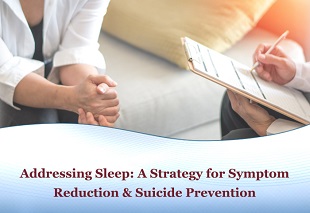PTSD: National Center for PTSD
Addressing Sleep: A Strategy for Symptom Reduction and Suicide Prevention
Continuing Education
This section brings together free in-depth Continuing Education resources for the Professional community concerned with trauma.
Addressing Sleep: A Strategy for Symptom Reduction and Suicide Prevention
- Date Created: 10/ 6/2020
- Time to Complete: 1 hour
- Credits: ANCC, APA, ASWB, ACCME, Other Orgs
- Skill Level: Intermediate
- Course Series: PTSD 101
 Author(s):
Author(s):
Description
In Veterans, insomnia has been shown to have direct and indirect associations with suicidal ideation, attempts and death. Insomnia symptoms may be associated with increased symptoms of PTSD and depression and associated with increased suicidal ideation.
This course reviews the impact of sleep disturbances on medical and psychiatric concerns and provides an overview of treatments for insomnia, including a comparison of Cognitive Behavioral Therapy for Insomnia (CBT-I) and sedative-hypnotic medications. The author also presents research supporting the benefits of CBT-I for pain management, PTSD, depression and suicide prevention.
Goals and Objectives
- Define the relationship between insomnia and morbidity
- Explain why CBT-I, and not sedative hypnotics, is indicated as treatment for insomnia
- Describe how treating insomnia improves more than sleep
- Enumerate CBT-I's suicide preventing side effects


























